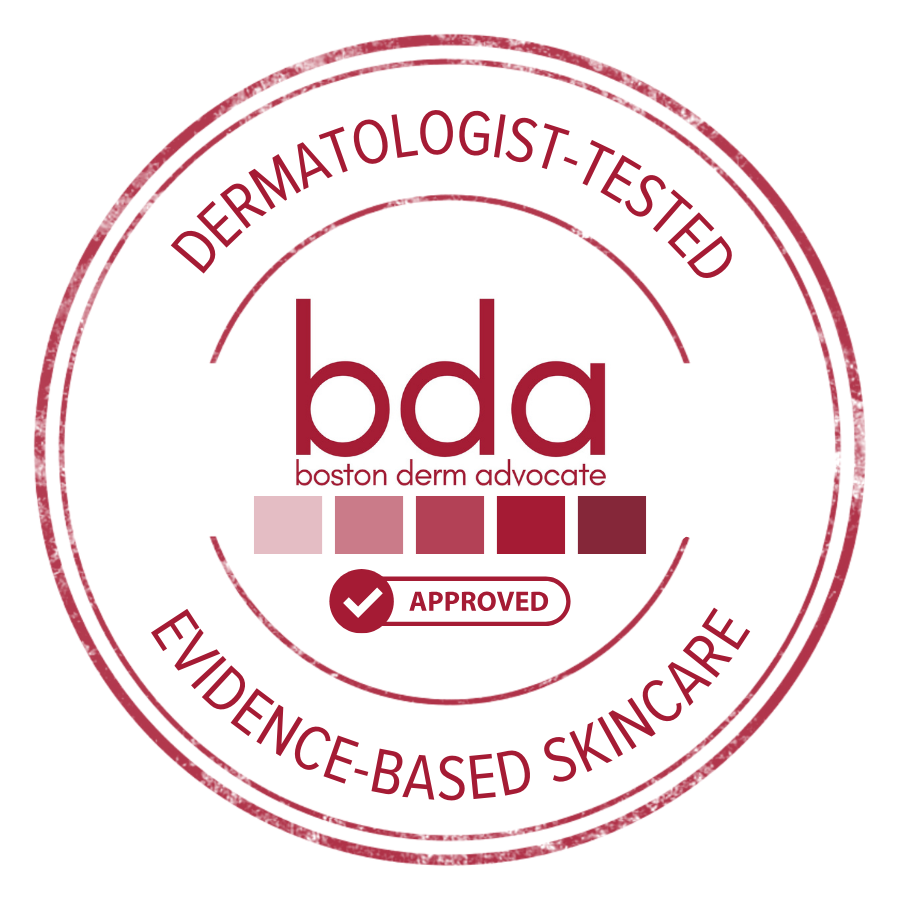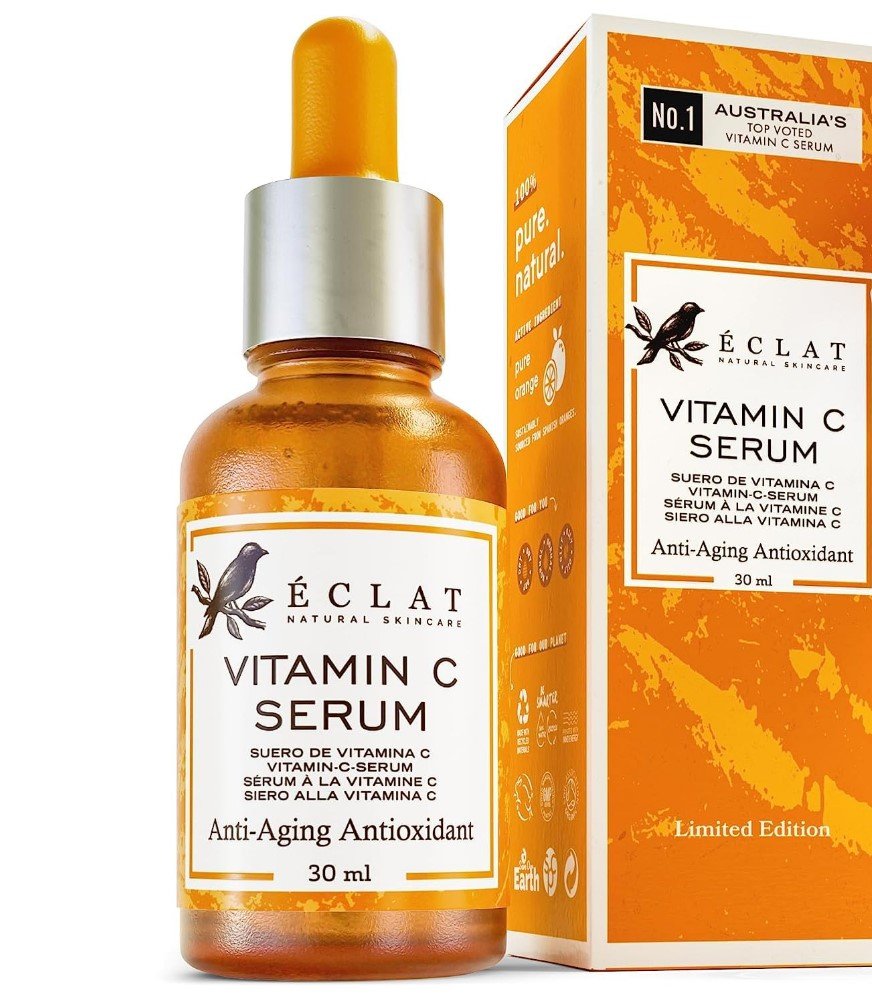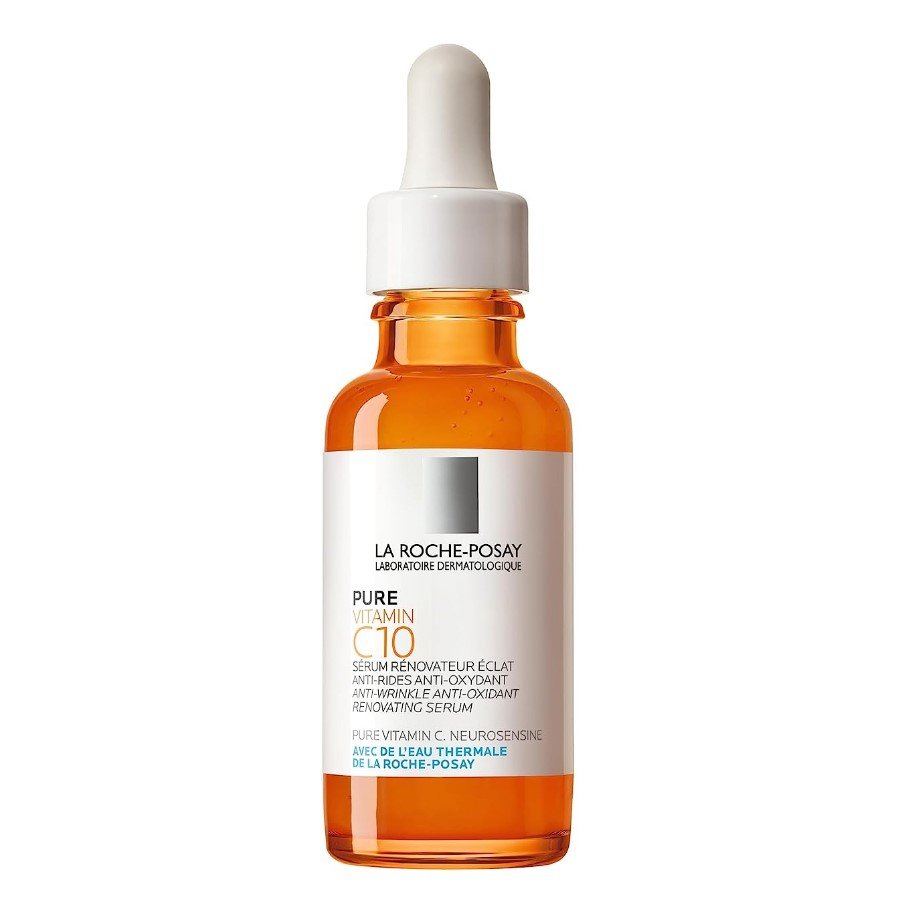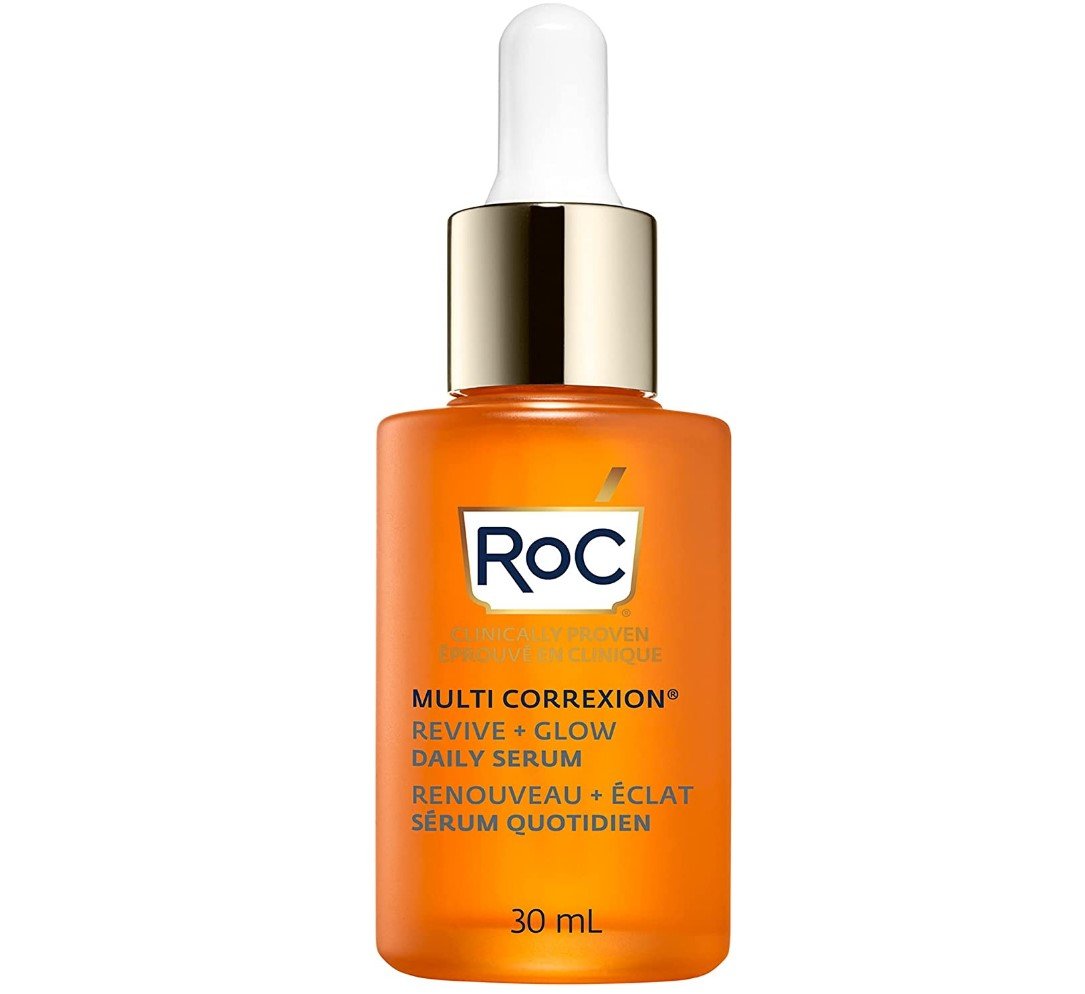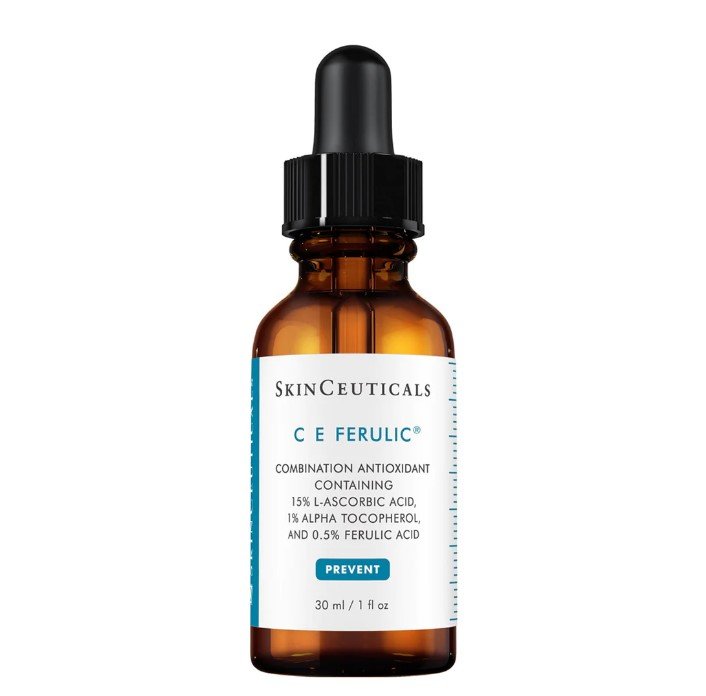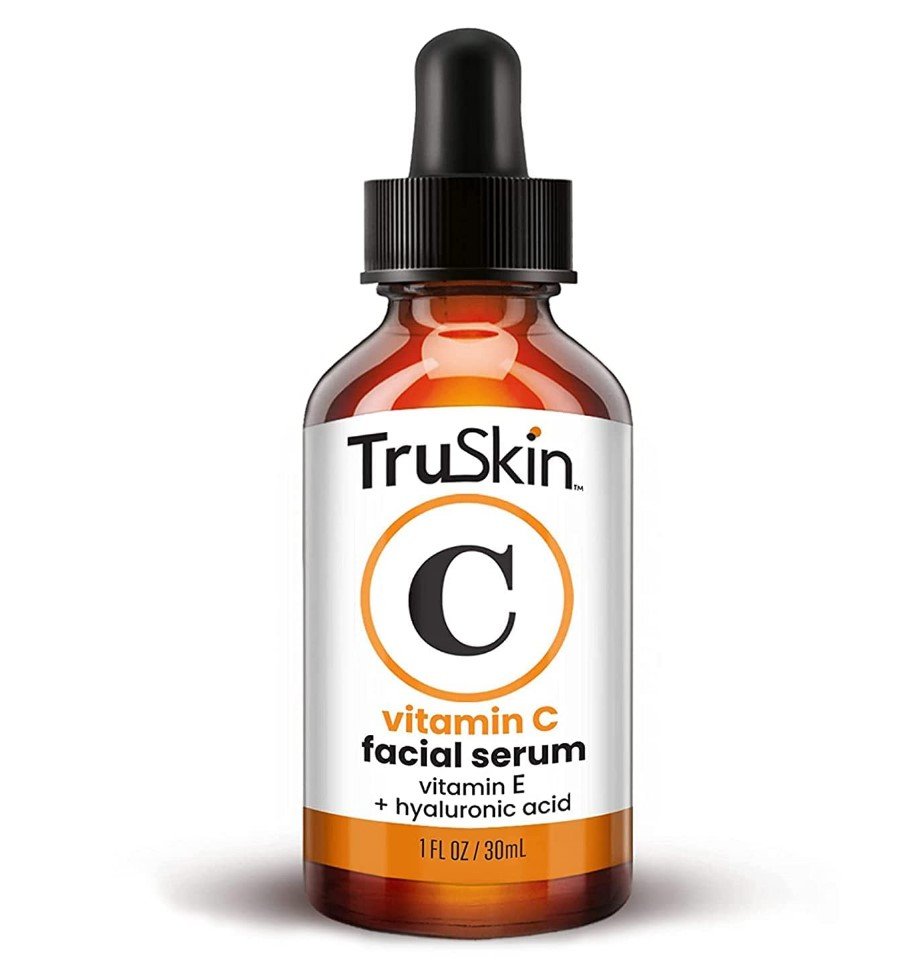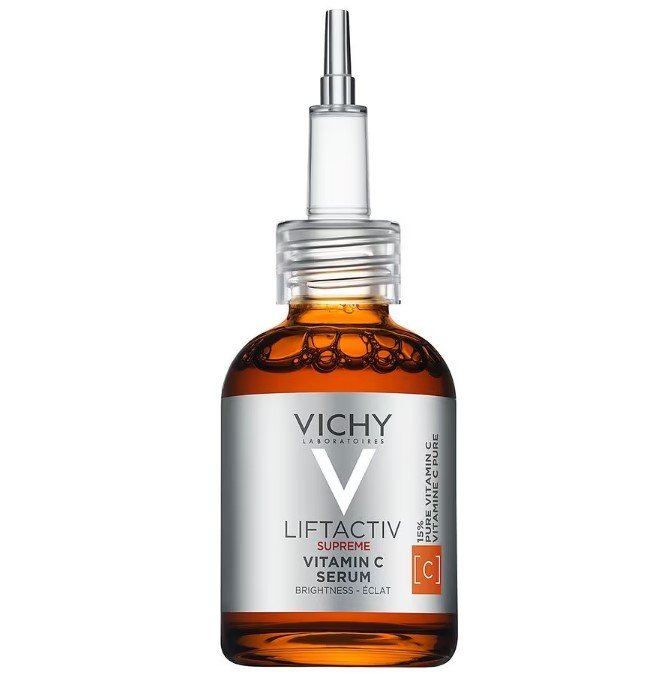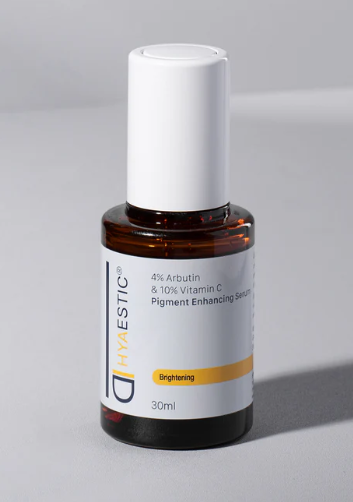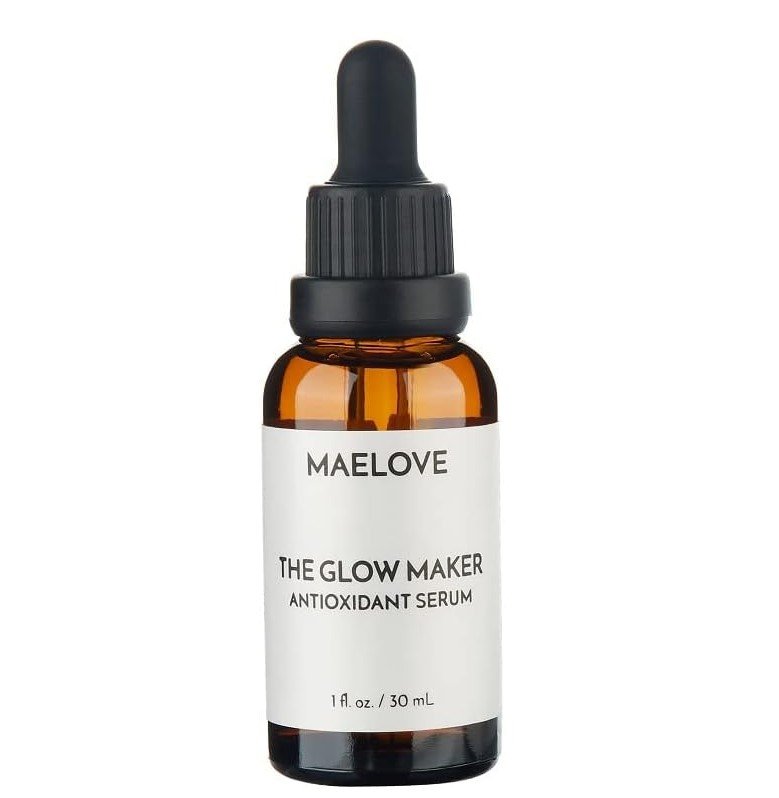The Best Vitamin C Serums Under $50 Blind Tested by Dermatologists
Our Favorite Affordable Vitamin C Serums
Best overall and for skin brightening + dark spots
RoC Multi Correxion Revive + Glow 10% Active Vitamin C Serum for Face
Why it’s great:
Highest overall blinded rating among the products < $50
Drawbacks:
None that we experienced
Active Ingredients: 10% active Vitamin C blend & energizing nonapeptides
Price per unit: $23.72 / Fl Oz
SkinSafe rating: A (top allergen free)
Notable quotes from our dermatologist team:
“This is a solid product which applied easily and actually gave a brightening result over 4 weeks. Loved using it”
Best for skin tightening and easiest to apply
TruSkin Vitamin C Serum for Face
Why it’s great:
Easy to apply and soft on sensitive skin
Drawbacks:
Slightly viscous but may not be a bad thing for dry/sensitive skin
Active Ingredients: 15% Vitamin C, Hyaluronic Acid, Vitamin E, Aloe Vera, Jojoba Oil
Price per unit: $19.77 / Fl Oz
SkinSafe rating: A (top allergen free)
Notable quotes from our dermatologist team:
“A few minutes after application, you can really feel the tightening effect on the cheeks”
Best for uneven skin tone and discoloration
Hyaestic Pigment Enhancing Serum 4% Arbutin & 10% Vitamin C
Why it’s great:
Provides an excellent glow on the skin while not being irritating. Also contains arbutin, which is an hydroquinone-free method for improving discoloration.
Drawbacks:
A very mild stickiness during application, which can be a plus for many users.
Active Ingredients: 10% Vitamin C and 4% Arbutin
Price per unit: $50.00 / Fl Oz
SkinSafe rating: Pending
Notable quotes from our dermatologist team:
“Brightens the skin really well. Not irritating and no unpleasant odor. Excellent glow after use.”
Best for underlying acne
La Roche-Posay Pure Vitamin C Face Serum with Hyaluronic Acid (HA) & Salicylic Acid (SA)
Why it’s great:
Interesting addition of salicylic acid can be helpful for gentle exfoliation and underlying acne or oily complexion
Drawbacks:
May not be ideal for those with underlying rosacea or eczema, because of the SA.
Active Ingredients: 10% Vitamin C
Price per unit: $45 / Fl Oz
SkinSafe rating: A (top allergen free)
Notable quotes from our dermatologist team:
“Definitely more viscous & fragrant than the other products, but seems to have great tightening sensation about 15 minutes after use”
Best for K-beauty enthusiasts and dry skin
SeoulCeuticals Korean Skin Care Korean Beauty - 20% Vitamin C Hyaluronic Acid (HA) Serum + CE Ferulic Acid
Why it’s great:
Reliable product that contains ferulic acid which can work well in combination with Vitamin C. Also contains HA for hydrating effect
Drawbacks:
Seems somewhat oily in texture, though this can be helpful for dry skin
Active Ingredients: 20% Vitamin C
Price per unit: $18.00 / Fl Oz
SkinSafe rating: A (top allergen free)
Notable quotes from our dermatologist team:
“Feels very hydrating and provides a glowing appearance for drier skin types”
Best for sensitive skin and ingredient clarity
Maelove Glow Maker Vitamin C
Why it’s great:
Vegan, cruelty-free, and gluten free. An all around good product. Extremely transparent in their labeling, ingredients, and practices.
Drawbacks:
A thinner viscosity than some may be used to.
Active Ingredients: 15% L-ascorbic acid, ferulic acid, HA
Price per unit: $38.00 / Fl Oz
SkinSafe rating: Pending
Notable quotes from our dermatologist team:
“Easy to apply without being oily. Feels hydrating!”
-
Embarking on this project was inspired by our own trials and tribulations, as well as our professional commitment as dermatologists to enrich our patients' understanding of skincare. Throughout our careers, we've encountered a myriad of vitamin C serums, each with lofty promises of skin rejuvenation. Our personal and professional experiences have taught us the disappointment that comes from high hopes dashed by products that fail to perform. In an industry brimming with choices, it's alarmingly easy to get lost and disillusioned.
Our daily practice involves treating a broad spectrum of skin issues and types, which highlighted the urgent need for a straightforward, budget-friendly guide to finding a vitamin C serum that truly works. This study is our attempt to cut through the noise, offering clear, tested advice to steer you away from the empty promises and toward real, affordable solutions.
This study aims to empower you in selecting a vitamin C serum that not only suits your skin's unique needs but also respects your budget. Our goal is to ensure you feel confident and informed about your skincare choices, especially when it comes to incorporating this powerful ingredient into your routine without breaking the bank.
-
Product Selection:
We searched the keywords ‘vitamin c serum’ on Amazon.com. We excluded sponsored items.
We selected the most popular products on Amazon’s query for the keywords.
We placed a filter ensuring that the product was under $50.
Finally, we selected the top 8 products on the search page fitting the above inclusion criteria.
Three products (Skinceuticals Vitamin C Serum with ferulic acid, Hyaestic Vitamin C with Arbutin, Maelove Glow Maker were provided by each respective company as a courtesy for inclusion in testing).
Product Testing:
Our testing team consisted of 5 subjects: 3 dermatology residents and 2 dermatology attendings located in Boston, Massachusetts. Our skin profiles are as follows:
Normal; Fair-medium with yellow undertones
Combination; Fair with warm undertones
Dry; Dark brown
Dry-sensitive; Fair with pink undertones
Combination; Fair-medium with tan undertones
We utilized a split-face approach, whereby each subject tested 4 different products simultaneously on 4 different parts of their face for a total of 3 weeks. One product was tested separately as it was provided after the conclusion of the first testing phase. For this product three dermatologists tested it blindly using the same methods as above. Testing was performed in a blinded manner; the different products were transferred to vials labeled with a deidentified number before being allocated to the subjects.
To ensure representative results, we structured the testing scheme so that subjects with the same skin types (e.g. combination, combination) did not test the same product. Products were used for at least 5 of 7 days each week. Each subject completed a chart of their metrics.
-
1. Skinceuticals comparison (the control product, not eligible to win the blind-testing)
2. eclat PURE Vitamin C Serum for Face 20% Vitamin C
3. TruSkin Vitamin C Serum for Face
4. Eva Naturals Vitamin C Serum for Face Plus Hyaluronic Acid, Retinol, Niacinamide & Salicylic Acid
5. SeoulCeuticals Korean Skin Care Korean Beauty - 20% Vitamin C Hyaluronic Acid Serum + CE Ferulic Acid
6. La Roche-Posay Pure Vitamin C Face Serum with Hyaluronic Acid & Salicylic Acid
7. Hyaestic 10% Vitamin C and 4% Arbutin
8. CeraVe Vitamin C Serum with Hyaluronic Acid
9. RoC Multi Correxion Revive + Glow 10% Active Vitamin C Serum for Face
10. Vichy lift activ Vitamin C serum
11. Maelove Glow Maker Vitamin C
-
In the panorama of skincare solutions, one shining star that has captured the attention of many is the vitamin C serum. This potent concoction, with key ingredients like l-ascorbic acid and ferulic acid, has the ability to renew skin cells, even out skin tone, and enhance skin texture.
These serums are lauded for their brightening effects that bring vibrancy and freshness to the skin, while also being capable of diminishing signs of aging, softening skin texture, and lightening dark spots.
With vitamin C's renowned potency as an antioxidant, these serums promise a desirable change in your skin, brightening the tone and offering protection against harmful environmental factors. In this comprehensive guide, we navigate the world of vitamin C-infused serums, elucidating their science, benefits, and the most effective ways to utilize them in your skincare routine.
-
Using a vitamin C serum is a game-changer for achieving and maintaining youthful, radiant skin. Here are some compelling reasons why incorporating a vitamin C serum into your skincare routine is highly beneficial:
Anti-aging properties: Vitamin C is renowned for its powerful anti-aging properties. It helps reduce the appearance of fine lines, wrinkles, and age spots, promoting a smoother and more youthful complexion. By stimulating collagen synthesis, it improves skin elasticity and firmness, resulting in a plumper and more toned appearance.
Brightens and evens skin tone: Vitamin C inhibits the production of excess melanin, the pigment responsible for dark spots and hyperpigmentation. Regular use of a vitamin C serum can help fade existing dark spots and prevent the formation of new ones, leading to a more even and radiant skin tone.
Protects against environmental damage: As an antioxidant, vitamin C fights free radicals that damage the skin cells and accelerate the aging process. It helps protect the skin from harmful UV rays, pollution, and other environmental stressors, minimizing the risk of premature aging and sun damage.
Enhances skin's natural defense: Vitamin C strengthens the skin's natural barrier function, improving its ability to retain moisture and defend against external aggressors. This helps to keep the skin hydrated, supple, and resilient.
-
There are several different forms of vitamin C used in skincare products, each with its own characteristics and benefits. Here are some common types of vitamin C used in serums:
L-Ascorbic Acid: L-ascorbic acid is the most potent and pure form of vitamin C. It is highly effective in stimulating collagen synthesis, reducing the appearance of wrinkles, and brightening the skin. However, it can be unstable and prone to oxidation when exposed to light and air, which can diminish its effectiveness. Look for serums with stabilized forms of L-ascorbic acid, such as those combined with ferulic acid or vitamin E. These combinations help enhance the stability and efficacy of L-ascorbic acid.
Ascorbyl Palmitate: Ascorbyl palmitate is a fat-soluble form of vitamin C. It is more stable than L-ascorbic acid and has excellent antioxidant properties. While it may not penetrate the skin as deeply as L-ascorbic acid, it still provides notable benefits for improving skin texture and reducing oxidative damage.
Sodium Ascorbyl Phosphate: Sodium ascorbyl phosphate is a stable and gentle form of vitamin C. It is suitable for those with sensitive skin and can effectively brighten the complexion, reduce redness, and improve skin tone. This form of vitamin C also exhibits anti-inflammatory properties, making it beneficial for individuals prone to acne or rosacea.
Magnesium Ascorbyl Phosphate: Magnesium ascorbyl phosphate is another stable form of vitamin C that offers antioxidant and skin-brightening benefits. It has a gentle nature, making it suitable for sensitive skin types. This form of vitamin C is also known for its ability to regulate sebum production, making it a valuable option for individuals dealing with oily or acne-prone skin.
Tetrahexyldecyl Ascorbate: Tetrahexyldecyl ascorbate is an oil-soluble derivative of vitamin C. It has excellent penetration properties, allowing it to reach the deeper layers of the skin. This form of vitamin C offers powerful antioxidant benefits, stimulates collagen synthesis, and promotes overall skin health.
When choosing a vitamin C serum, consider your skin type, concerns, and preferences. If you have sensitive skin, opt for stabilized and gentle forms of vitamin C. For individuals seeking maximum potency and effectiveness, L-ascorbic acid serums are a top choice.
-
To ensure you're selecting a high-quality and effective vitamin C serum, here are key factors to consider:
Concentration: Look for a serum with a concentration of vitamin C between 10% and 20%. Higher concentrations may not necessarily provide better results and can potentially irritate the skin. Finding a balance that suits your skin's tolerance and needs is crucial.
Stability: Choose a serum that utilizes stable forms of vitamin C, such as ascorbyl palmitate, sodium ascorbyl phosphate, or magnesium ascorbyl phosphate. Stability ensures that the vitamin C remains active and potent over time, providing maximum benefits to your skin.
Additional Antioxidants: Vitamin C works synergistically with other antioxidants, enhancing its effectiveness. Look for serums that combine vitamin C with ingredients like vitamin E, ferulic acid, or niacinamide. These combinations provide enhanced antioxidant protection and may boost the overall anti-aging benefits.
Packaging: Vitamin C serums are best stored in dark, opaque bottles to protect them from light and air exposure, which can degrade the vitamin C. Look for serums packaged in airless pump dispensers or dark glass bottles with airtight seals to ensure the product's stability and longevity.
Texture and Absorption: Consider the texture and absorption of the serum. Lightweight and fast-absorbing formulas are preferable, as they allow for easy application and layering with other skincare products. If you have dry skin, you may opt for serums with hydrating properties to prevent any potential dryness or discomfort.
-
When it comes to what to look for in a vitamin C serum, prioritize one that features a stabilized form of vitamin C, usually L-ascorbic acid. This stable form ensures that the serum remains effective over time, protecting the skin from the damaging effects of free radicals. Vitamin C is typically combined with hydrating elements like hyaluronic acid and often ferulic acid, to enhance its effects.
The primary ingredient in these serums is L-ascorbic acid, a form of Vitamin C that is water-soluble and highly potent. However, its instability in aqueous solutions has led to the development of various Vitamin C derivatives designed to improve stability, absorption, and overall activity in topical formulations.The benefits of Vitamin C and its derivatives have been a controversial topic. Clinical studies have shown that topical application of Vitamin C serums can lead to significant improvements in skin health. For instance, a double-blind, half-face study revealed that topical application of a Vitamin C preparation resulted in visible and statistically significant improvement in skin wrinkling after 12 weeks. This improvement was correlated with biopsy evidence of new collagen formation, suggesting that Vitamin C serums can stimulate the skin to repair photodamage (1).
Moreover, on a more theoretical front, Vitamin C is known to play a crucial role in combating photodamage. It does so by neutralizing free radicals and reducing oxidative stress in the skin, which are key contributors to skin aging. Furthermore, Vitamin C has been found to improve skin discoloration and boost collagen production, thereby enhancing skin health and appearance (2).
The science behind Vitamin C serums is both complex and fascinating. The use of L-ascorbic acid and its derivatives in these serums is backed by a growing body of scientific evidence, highlighting their role in improving skin health and reversing signs of aging. As research progresses, we can expect to see even more sophisticated formulations designed to maximize the benefits of this vital nutrient.
-
Proper application and usage of a vitamin C serum are essential for optimal results. In this section, we offer practical tips and guidelines on how to incorporate a vitamin C serum into a skincare routine. We discuss the recommended steps for applying a vitamin C serum, including cleansing the face, applying the serum to clean, dry skin, and following up with moisturizer and sunscreen. We also provide information on frequency of use and potential side effects to be aware of. By offering clear instructions on how to use a vitamin C serum effectively, we help readers maximize its anti-aging benefits.
When applying vitamin C serum, start by cleansing the skin with a gentle moisturizer in the morning
Next, apply the serum after your skin is dry, allowing it to absorb before layering vitamin C or other skincare products.
A moisturizer and sunscreen can then be used.
This routine can be followed daily for the best results. It's important to note that while vitamin C is generally safe for all skin types, people with sensitive skin should patch test the product on their skin prior to use.
-
It's only natural that you have questions when considering the addition of a new product to your skincare routine. You might be wondering whether vitamin C serums are suitable for your skin type, how long it takes to see results, or whether these serums can be used in combination with other skincare products. In this section, we address these common questions and more, providing you with comprehensive, evidence-based responses.
What is the role of a vitamin C serum in skin care?
Vitamin C is a potent antioxidant that aids in protecting the skin from environmental damage, brightening the skin, and enhancing the skin tone.
What are the benefits of using a vitamin C serum?
The benefits of vitamin C are multifaceted. This potent antioxidant not only protects the skin but also brightens it, helping to improve the overall tone of the skin and provide a healthy glow. It's also effective at reducing signs of aging and hyperpigmentation.
What form of vitamin C is most effective in a serum?
L-ascorbic acid, a stable form of vitamin C, is the most effective for topical use. It's potent and can provide the full benefits of vitamin C when used properly.
Why is vitamin C often paired with vitamin E and ferulic acid in serums?
Vitamin E and ferulic acid enhance the stability and effectiveness of vitamin C. They work synergistically to provide skin protection and brightening benefits.
How often should I apply a vitamin C serum for the best results?
It’s best to use a vitamin C serum daily. Most dermatologists recommend applying it in the morning to protect your skin from free radicals throughout the day.
Which concentration of vitamin C is best in a serum?
Serums on the market typically contain between 10 to 20 percent vitamin C. For most people, a 15 percent vitamin C serum is a great choice.
How do I incorporate a vitamin C serum into my skin care routine?
Vitamin C serum is best applied after cleansing and toning but before moisturizing. If you're using other serums or treatments, it's best to layer them from thinnest to thickest – vitamin C serum is usually one of the first steps.
Can I use vitamin C serum if I have sensitive skin?
Yes, but it's crucial to choose a serum that's designed for sensitive skin. Vitamin C, in its different forms, can be used by people with sensitive skin when formulated correctly.
What is the best way to choose a vitamin C serum?
Choosing a vitamin C serum depends on your skin type, budget, and skin concerns. Look for one that contains a stable form of vitamin C, such as L-ascorbic acid, and consider the concentration of vitamin C in the product.
What changes can I expect to see in my skin after using a vitamin C serum?
After incorporating a vitamin C serum into your daily routine, you may notice a brighter complexion, an even skin tone, and a change in the appearance of dark spots over time.
Which are the best budget vitamin C serums in 2023?
All the products tested in our study (Except Skinceuticals) is under $50 and are considered affordable for Vitamin C serums. See our results above.
What is the role of hyaluronic acid in a vitamin C serum?
Hyaluronic acid is a potent hydrator that can help to maintain skin moisture. When combined with vitamin C, it can help to plump up the skin and reduce the appearance of fine lines and wrinkles.
How can vitamin C serum improve the texture of my skin?
Vitamin C is known for its ability to brighten and smooth the skin. Over time, using a vitamin C serum can lead to a noticeable improvement in skin texture.
Is there a best time to apply vitamin C serum?
Vitamin C serum is usually applied in the morning to protect the skin from free radicals throughout the day.
Does a brightening vitamin C serum actually lighten dark spots?
Yes, vitamin C serums can help to lighten dark spots over time. They work by inhibiting the enzyme responsible for melanin production, which in turn can reduce the appearance of hyperpigmentation.
